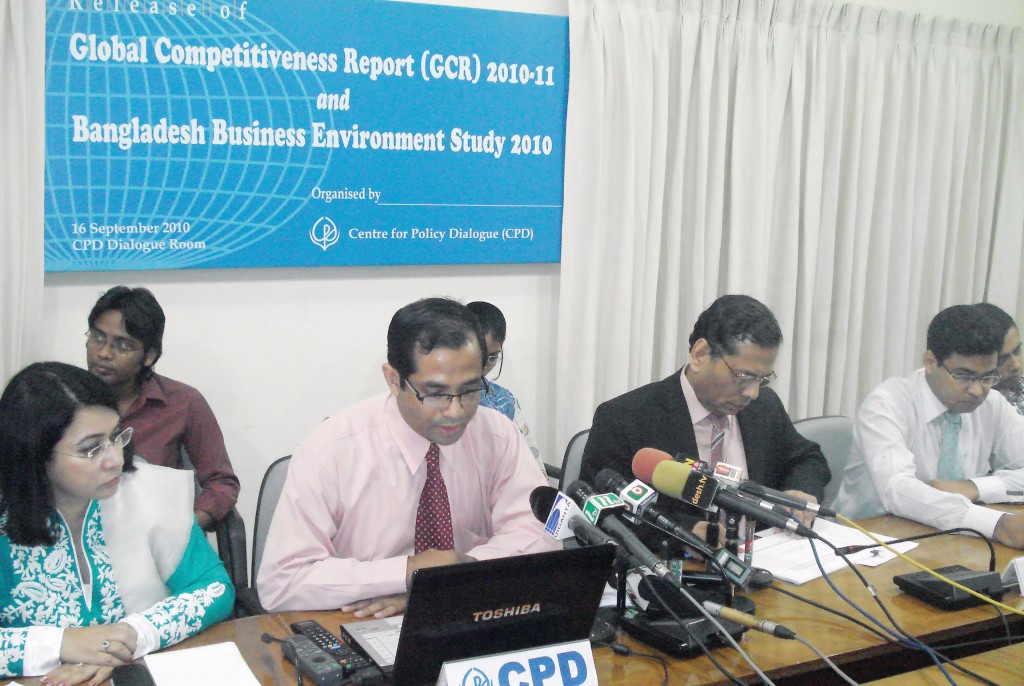Bangladesh’s rank came down by one position in the Global Competitiveness Index (GCI) from 106th position to 107th in 2010, the Global Competitiveness Report 2010-2011 of the World Economic Forum (WEF) revealed. The Global Competitiveness Report (GCR) is an annual publication of the WEF, popularly known as the Davos Forum. The CPD, as a partner organisation of the WEF conducts the Executive Opinion Survey every year; this year’s being the 10th in this series. Dr Khondaker Golam Moazzem, Senior Research Fellow, CPD briefed the print and electronic media on Global Competitiveness Report 2010-11 and Bangladesh Business Environment Study 2010 in a press briefing organised by CPD at its Dialogue Room on 16 September 2010. This year, a total of 139 countries have been assessed, whereas it was 133 in 2009. The survey ranks countries (including Bangladesh) according to the business competitiveness environment based on information from the National Perception Survey with regard to various contemporary issues of concern.
According to the survey, the major deterrent factor for this declined position is inadequate supply of infrastructure in 2009. Around 80 per cent of the entrepreneurs were less confident regarding government’s measures to increase the supply of electricity and gas in 2010, as the initiatives were considered to be inadequate. Inefficient government bureaucracy is the second most important factor, and it is becoming a major hindrance for the growth of business and investment. Corruption slipped to third with position from last year’s second position, undocumented payment or bribes by the firms to the public servants for awarding of public contracts still widely prevalent.
Perception has been improved for some factors such as access to financing, government stability, crime and theft, tax rates and public health. On the other hand, perception has declined for some other factors such as policy instability, tax regulations, foreign currency regulations, work ethics and labour regulations. Projecting the economic growth, the CPD report said that most of the world economy is likely to recover from the recession in 2010. The interviewees of the Bangladesh study also perceived that growth prospect of Bangladesh in 2010 is stronger than last year because of strong growth prospect of export in the post-crisis period. Bangladesh’s GCI overall score, however, has been increased by 2.5 per cent. Score in basic requirement was increased by 3 per cent, efficiency enhancers increased by 2.3 per cent, and innovation and sophistication increased by 0.3 per cent. Highest score was obtained in health and primary education (10.5 per cent).
Through CPD’s Rapid Perception Survey, more than 50 per cent businessmen opined that Bangladesh’s trade and investment with India will be accelerated in view of recent initiatives undertaken by both the governments. The report also said that most of the businessmen were concerned about the impact of inflation on cost of production. Lending rates of banks are still considered to be high, which affect business adversely. Employment in the surveyed factories was not adversely affected even in the period of the global financial crisis, and surprisingly, 63 per cent businessmen opined that employment has increased in their factories this year.
All the South Asian countries except Sri Lanka have failed to retain their last year’s positions. Of them, Pakistan has dropped by 22 positions, India dropped by 2 positions, while Sri Lanka jumped up by 17 steps. Professor Mustafizur Rahman, Executive Director; Dr Fahmida Khatun, Head of Research; Dr Masudur Rahman, Research Fellow; and Dr Nazrul Islam, Research Fellow of CPD were also present during the briefing session.


